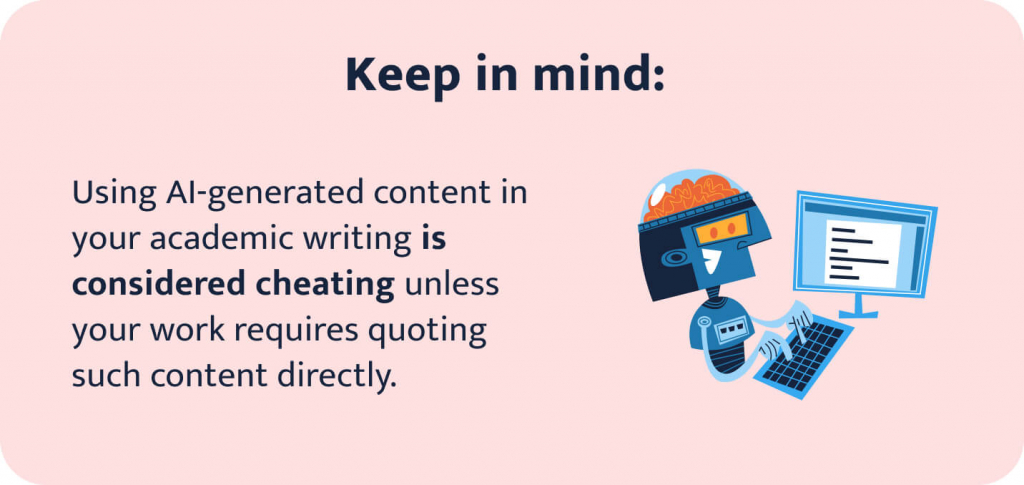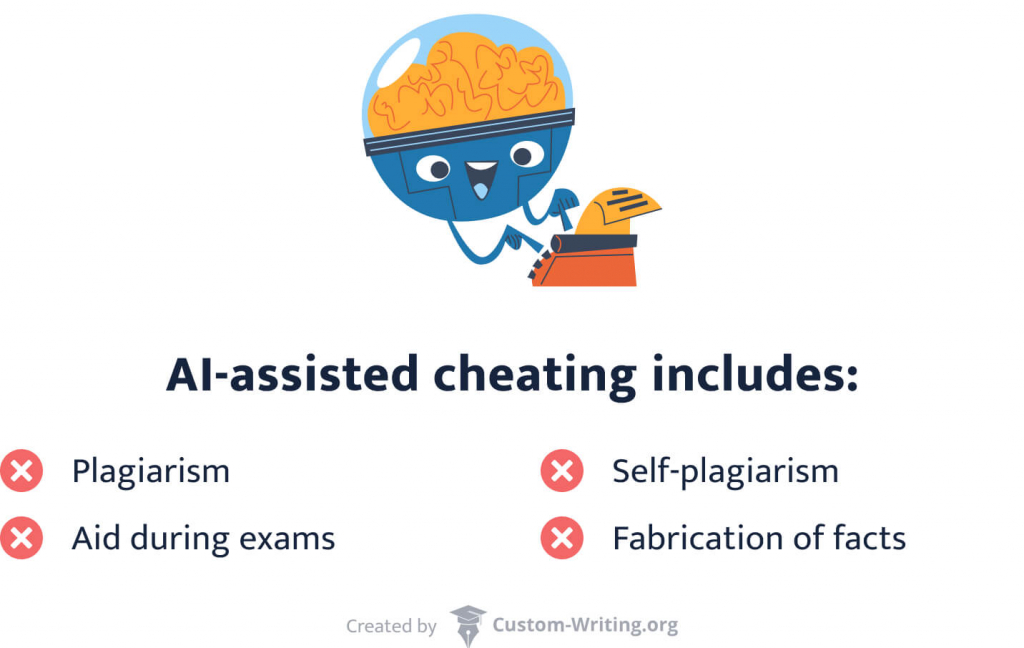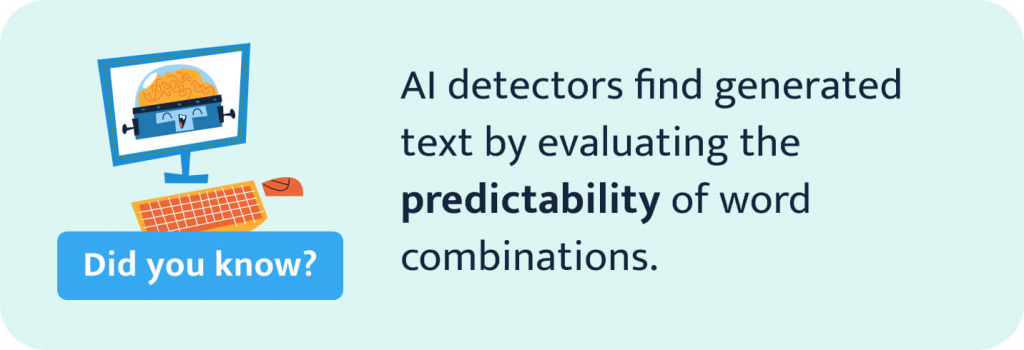The cheating culture has existed since the dawn of academia, but AI has brought it to a whole new level. With the constant technological improvements, students can now fabricate entire assignments using artificial intelligence. And ChatGPT is by far the most prominent and innovative tool in that regard.
Teachers sound the alarm while the internet gets filled with flashy headlines about the educational crisis.
But:
- Is everything as bad as it seems?
- Is Chat GPT considered cheating?
- What can be done to keep the academic integrity?
This article by our custom-writing experts will answer these and many other questions. There’s also a bonus section that will tell you how to adhere to ethical standards and improve your academic experience, so make sure to read until the end!
🤖 ChatGPT and Academic Integrity
Cheating involves copying someone else’s work without crediting the author, be it someone who wrote textbook answers or your classmate whose essay you’ve copied.

Professors can usually identify plagiarized papers if, for instance, two or more students wrote identical sentences. However, detecting ChatGPT-generated texts is way more difficult since the chatbot generates unique and customized answers on every topic.
The rise of AI has prompted educators to address new concerns regarding how to prevent ChatGPT cheating. Many of them express a desire to adapt to the changing landscape and use technology for better learning experiences. At the same time, when it comes to grading students, most of them feel the need to create test questions and assignments that are resistant to cheating with tools like ChatGPT.
The concerns are serious enough to make many educators panic. According to The Conversation’s survey, 89% of teachers are worried about students “misusing” AI, but what counts as misuse depends on the case. Specifically, 44% are bothered about students using AI to write entire essays, while 42% are worried about the need to update university honor codes and plagiarism policies because of AI.
Why Are Students Cheating with Chat GPT?
Everyone knows cheating is bad, but it still persists. There are countless reasons why that happens. For instance, students may feel overwhelmed with the number of projects they have to finish, be stuck with a particular task, have a packed schedule, or simply look for quick ways to get good grades.
Sometimes, the reasons behind cheating may be more specific, especially in the age of AI technology:
- ChatGPT is super easy and free to use. You only need to submit your email and phone number to log in.
- Academic pressure is constantly increasing. Without good grades, students won’t get a diploma, which may leave them without a prestigious job and the social status they desire.
- Good grades play a bigger role than actual knowledge. After all, grades are what your future employers will be looking at.
- ChatGPT is targeted toward a younger audience. This age group is more open to using the newest AI.
- The chatbot generates original texts that sound natural. It creates an impression that no one will suspect you of using it to cheat.
All this makes ChatGPT an extremely attractive tool for cheating, even among those who are typically opposed to academic dishonesty.
What Do Statistics Say?
It’s true that thousands of students use ChatGPT in their studies. However, it would be a gross overstatement to say that everyone utilizes it to generate complete answers.
According, to a Forbes survey, students have more nuanced opinions towards this issue:
- Only 17% of students don’t change or edit their answers after using the chatbot.
- 41% of people consider using ChatGPT for assignments and exams morally wrong.
- Another 48% think using AI to help with studying is okay.
That leaves us with 20% of students who don’t consider using chatbots to complete exams cheating.
But are they right about it?
🤔 So, Is Using ChatGPT Cheating?
One of the most commonly asked questions among students and professors is, “Is ChatGPT cheating?” And the short answer is – yes, it is.
Technically, using the chatbot to complete an exam or assignment is considered cheating. But there may be some rare exceptions.
For instance, suppose you’re working on a research paper concerning artificial intelligence and need to analyze ChatGPT’s responses. In that case, there’s nothing illegal or ethically wrong with using the chatbot and giving examples of the texts generated by the tool.

In any other case, using ChatGPT-generated answers is cheating, even if the text turns out unique.
Here’s why.
In academic circles, it’s believed that good work is based on honesty. If you try to claim someone else’s work as your own, the faculty and administration see it as a big problem:
- The work you’ve provided doesn’t show your actual knowledge and skills.
- You are essentially stealing from someone else.
- Moreover, you’re lying to the faculty by pretending the work is yours.
Now, you might be wondering: why is it called stealing when it’s an inanimate chatbot generating new texts from scratch?
Well, things are more complex than that. Every text the chatbot generates is based on other people’s texts, many of which are protected by copyright law. So, using AI tools automatically means plagiarizing and taking ideas from these people (sometimes verbatim, which we will demonstrate in the next section).
👀 Types of Cheating with ChatGPT
Now you know that AI-assisted cheating is possible and very widespread, let’s try to answer another question: how exactly can you cheat with Chat GPT? After all, there are also ways to use it ethically, and not everything counts as academic dishonesty.
Well, aside from plagiarism, there are three other ways to cheat:
- Self-plagiarism. Some students don’t want to overwork themselves, so they turn in the same work twice. They use a chatbot to paraphrase one of their papers and pretend it’s a new work.
- Fabrication. One of the downsides of ChatGPT is that it often generates fake data and statistics. For instance, it can refer to non-existent sources to prove a statement. If a cheater uses it in their work, it means they’re using false evidence.
- Aid during exams. There are cases when students use ChatGPT during the exam itself. They answer the questions or write essays with the help of a chatbot.
Let’s now look at some examples to see how different types of cheating may occur.
Plagiarism
Suppose you need to write a 4-paragraph nursing essay and ask the chatbot to generate it for you.
Here’s what you’ll get:
Sounds good, right? Students who don’t have much time or don’t want to write the essay themselves may be tempted to copy it and submit it as their own.

What they don’t know is that:
- This seemingly unique text contains at least 17% plagiarism (marked in bold), with much of the remaining text surfaced from other sources and rearranged.
- The essay is also not structured well. For instance, the conclusion here resembles a third body paragraph rather than a conclusion.
- Other students will likely receive a very similar answer when asking ChatGPT to write a nursing essay on the same topic.
Don’t believe us?
Check out the examples below and see how similar they are:
All in all, copying this essay certainly wouldn’t get you a good grade.
Aid with Exam Questions
Suppose you’re answering exam questions on vaccines, and you have no idea how to answer one of them. ChatGPT can answer it for you. It will then describe the benefits of using electronic health records systems to facilitate vaccination programs and recommend you to check other sources:
Although the chatbot here reminds about its limitations and insists on consulting reliable sources, some students may ignore the warnings and copy the answer or its parts.
But here’s the catch – “EHR” in this question is not “electronic health records.” Instead, it refers to “effective household reduction,” which is indeed a vaccination approach. This means that the generated answer is entirely useless.
Luckily, the chatbot didn’t fabricate any facts about the vaccination method it knows nothing about, but it could’ve done that, too.
Fabrication
Suppose you need to quickly find real-life evidence of Pfizer’s vaccine against Covid-19 to use in your answer. You could write a prompt like this:
Using this example in your work is a bad idea, since none of the articles published around this time in New England Journal of Medicine focused specifically on Israel and featured the cited quotation.
All in all, AI-assisted cheating may seem very easy and attractive, but it’s more than likely to yield incorrect results. And what’s more, it can have negative consequences for you personally and get you in trouble with the school.
How exactly can it happen? Read on to find out.
🙅 Why Cheating Is Bad for You
The negative consequences of cheating can be both legal and ethical. They involve virtually all aspects of a student’s life.
Here are the main reasons why cheating is a terrible idea:
- When students submit papers that are not their own, they miss out on the chance to practice and develop their critical thinking skills, creativity, and judgment.
- Because of cheating, students may find themselves lacking fundamental knowledge of specific subjects since they simply present correct answers without actually learning anything.
- Cheating can become a habit that prevents students from doing well by themselves, not just at school but also at work.
- Using ChatGPT to complete their assignments makes most students feel guilty. The fact that they couldn’t handle the task independently can affect their self-esteem.
- Sometimes, cheating can have truly fatal consequences. For instance, if a student studies medicine and copies answers to pass an exam, they may end up lacking the knowledge necessary to diagnose or cure an illness properly.
- If students are caught using ChatGPT illegally, they may be expelled from college, get a probation period, and even have problems being accepted to different schools or finding a job.
Schools have different methods of dealing with students who use AI tools for cheating, so it’s best to get familiar with your school’s guidelines. Additionally, some teachers may be more lenient when the student is caught using the chatbot for the first time. Still, there definitely won’t be any indulgences the second time.
📌 Can You Get Caught Cheating Using Chat GPT?
Although ChatGPT-generated texts are difficult to spot with the naked eye, there are some very effective ways to recognize such texts and catch cheaters. Of course, we’re talking about AI detectors.
The mechanism of these programs is similar to that of the chatbot itself. While ChatGPT generates a string of words and phrases depending on predictability, detectors use this predictability to recognize AI-written texts. The more likely the words to go together, the higher the possibility that the chatbot has written the passage.

Papers that students submit are run through at least one ChatGPT cheating detector. Although such detectors are still in progress, they are very accurate. For example, Turnitin – an AI finder favored by most teachers – can identify as many as 98% of generated texts.
Can ChatGPT Cheating Checkers Lead to False Accusations?
As unfortunate as it may be, cheating with the help of ChatGPT has created problems not only for cheaters but also for those who write their papers without any help from AI.
It’s hard to believe, but the limitations of AI detector tools can lead to false accusations. For instance, since detectors rely on predictability, they can easily mark a human-written text that happens to be predictable as an AI-generated one. As a result, an honest student gets accused of what they haven’t done.
Many teachers know about these limitations and try to rely on themselves rather than detectors. After all, it’s not impossible to sense an AI-written text based on your personal judgment. For instance, if a human has written the text, it likely has a natural, nice flow that “feels” real. A generated text will lack this flair.
Sadly, not all educators understand this issue. The most notorious case happened when a teacher had failed the entire class due to the suspicion that everyone had used AI (interestingly, this teacher checked the texts with ChatGPT itself instead of using reliable AI detectors.) It shows how professors may become paranoid about students using Chat GPT to cheat.
According to Educause’s survey, 23% of teachers believe that students submit AI-generated assignments without even editing or reading through them. As we already know, that’s not necessarily the case. Such overly strong concerns about students using AI and cheating may become a disaster and usually don’t result in anything good.
If you want to avoid being wrongly accused of using AI to cheat, it’s best to take precautionary measures:
- Keep your drafts and outlines.
- List all the sources you used.
- Describe your work process in detail.
All in all, it’s best to be as transparent and honest about the writing process as possible.
Some students go even further: they scan their texts using an AI essay checker and then make necessary adjustments. Although doing so can be time-consuming, it’s an effective way to avoid potential problems.
🎓 Bonus Tips for Cheating-Free AI Use
Now you know that ChatGPT is cheating and can cause you lots of trouble unless you utilize it ethically. That’s why we urge you to avoid using the chatbot to generate complete answers or assignments.
However, it doesn’t mean you can’t use this helpful tool at all. The chatbot can become a great assistance in your studies if you use it in the right way. Read on to learn more about it.
Use It as a Supplementary Tool
There are many ways in which you can use ChatGPT for inspiration. Remember, your goal is to get assistance and to have a whole work written for you.
For instance:
- You can use it in your homework as a summarizer, paraphraser, or essay writing aid.
- It can help you plan the individual slides of a PowerPoint presentation.
- It can even assist you with research by or suggesting a hypothesis idea or formulating a proper research question.
- And, of course, the chatbot is capable of editing and proofreading your writing.
Feel free to check out our articles on the ethical use of AI in studies to learn more about using ChatGPT as a study helper.
Use AI Helper Tools to Enhance Your Studies
Did you know there are countless AI-based tools that can help you with homework-related tasks? They’re free, advanced, and completely legal to use.
Here are the top 10 most powerful tools for you to check out:
- An attention grabber generator will help you create a perfect hook sentence.
- An introduction writer is great for generating customized examples of opening paragraphs.
- Using a notes generator will help you convert any text into a set of study notes.
- A key points generator will condense a lengthy chapter and present its main ideas conveniently.
- You can use a quote explainer whenever you stumble upon an intriguing or obscure quotation.
- A transition generator for essays is a great tool for improving your text’s flow.
- Using a Chat GPT essay maker allows you to create customized writing samples.
- An essay format generator makes outlining assignments much easier.
- There’s even a poem analysis generator that will interpret any poetic text for you.
- Finally, a sentence-to-poem converter is capable of composing actual verse based on a topic of your choice.
Practice Your Information Literacy Skills
Before using any AI tool, developing your research skills is essential. It’ll help you identify plagiarism, ethically questionable or nonsensical answers, and misinformation. After all, ChatGPT is not all-powerful. You need to use your own judgment and double-check everything the tool tells you.
Fact-Check the Results
Another thing to note is that ChatGPT is not a reliable source of information. Doing additional research and fact-checking is necessary to ensure you get everything right.
To conduct good research, you need to find credible sources. A source can be considered credible when it doesn’t favor one side, is supported by proof, and is created by a reliable person or an organization.
Checking the credibility of a source is a vital skill to find accurate information and ensure your arguments are based on facts.
When assessing a source, consider the following:
- The information should be recent.
- The source should relate to your research.
- The author and publication should be experts in your research topic.
- The author’s references should be easy to find, straightforward, and unbiased.
- For online sources, the URL and design should show their reliability. If the three letters at the end of the site’s domain say “edu” (educational), “gov” (government), “org” (nonprofit), or “com” (commercial), it means that the website is likely to be reliable.
Be Open about AI Use
As a student, it’s best to be open about using ChatGPT for inspiration. That way, you can be more transparent and avoid misunderstandings and accusations. Of course, it can only be applied if you use AI tools ethically and not for cheating.
Suppose you have used the chatbot to generate topics or create an outline. In that case, add an acknowledgment at the end of your paper or as a footnote. Include the link to the chatbot, the date, the reason why you used it, and the prompt.
For example:
Example:
I acknowledge that I have used ChatGPT [https://chat.openai.com/] as assistance while planning and outlining this assignment on December 20th, 2023. The following prompts were used:
- What can an essay on AI use in healthcare be about?
- Write 3 different sample outlines for a 5-paragraph essay on AI use in healthcare.
Learn to Cite ChatGPT Properly
If you directly use a text generated by ChatGPT for research purposes, you should reference it as your primary source. Remember not to reference ChatGPT as a source of factual information. The chatbot might not always be reliable and isn’t seen as a trustworthy source for academic writing.
Follow Your School’s Guidelines
Finally, it’s important to familiarize yourself with your school’s policies on AI writing tools and stay informed about any updates. Different universities usually have different rules about using ChatGPT. If you’re unsure what’s allowed, always check with your instructor since ethical use of AI tools will help you avoid problems.
✅ Key Takeaways
Since ChatGPT is a tool that’s growing in popularity with students, it’s essential to understand how to use it ethically to avoid problems with the school. Next time you decide to use the chatbot to assist you with your studies, make sure to:
- check with your school guidelines,
- take all the precautionary measures to ensure there’s no cheating,
- use AI only as a source of inspiration or guidance.
And with that we conclude our exploration of AI-assisted cheating and its pitfalls. We hope that you’ve found this article helpful. What is your opinion on ChatGPT and academic dishonesty? Share your opinion in the comments below!
Check out other excellent materials about ChatGPT and similar AI tools:
- ChatGPT Alternatives for School
- Pros & Cons of ChatGPT for Students
- ChatGPT Essay Examples
- ChatGPT and College Essays
- 17 Best AI Tools for Homework in 2026
🔗 References
- What Do AI Chatbots Really Mean for Students and Cheating?: Stanford University
- ChatGPT, Cheating, and the Future of Education: The Harvard Crimson
- Consequences for Academic Dishonesty: Northern Illinois University
- How Cheating in College Hurts Students: U.S. News & World Report
- Guidelines for the Ethical Use of Generative AI (i.e. ChatGPT) on Campus: Santa Clara University
- The Ethics of College Students Using ChatGPT: The University of North Carolina at Chapel Hill
- ChatGPT: Master Homework and Assignments without Cheating: Geeky Gadgets
- Using ChatGPT Effectively and Ethically: University of Arkansas


